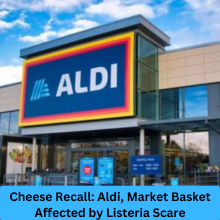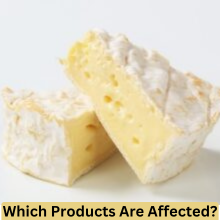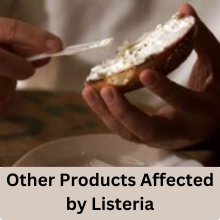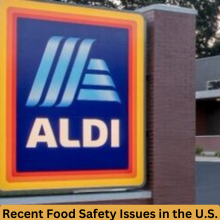In recent days, a wide-ranging food recall has been announced involving soft ripened cheeses sold at popular grocery chains, including Aldi and Market Basket. The recall, prompted by concerns over listeria contamination, highlights ongoing challenges related to food safety in the U.S. As consumers become more conscious of the risks of foodborne illnesses, this recall is yet another reminder of the importance of vigilance when it comes to food safety.
This article breaks down the details of the cheese recall, explains what listeria is, and offers advice on how to protect yourself and your family.
What is Listeria?
Listeria monocytogenes is a dangerous bacterium found in some food products. While it may not cause harm to everyone, it poses a significant risk to vulnerable populations, such as the elderly, pregnant women, newborns, and individuals with weakened immune systems.
When contaminated food is consumed, listeria can lead to severe infections, including listeriosis, which can cause symptoms such as fever, muscle aches, nausea, and diarrhea. In severe cases, it can lead to complications like meningitis or even death. Pregnant women are particularly at risk because listeriosis can cause miscarriages, stillbirths, or serious health problems for newborns.
Details of the Cheese Recall
The recent recall affects several types of soft ripened cheese produced by Savencia Cheese USA, a major supplier in the dairy industry. According to a Food and Drug Administration (FDA) notice, investigators discovered traces of listeria in the equipment used to produce these cheeses at the company’s facility in Lena, Illinois. As a result, multiple cheese products were recalled, including well-known brands such as:
- Emporium Selection Brie
- La Bonne Vie Brie
- La Bonne Vie Camembert
- Market Basket Brie
These cheeses were sold at Aldi, Market Basket, and possibly other grocers across the U.S. Consumers who purchased these products have been urged to check the packaging for specific best-by dates. The affected cheeses have a best-by date of Dec. 24, 2024.
The Source of Contamination
The source of the contamination was traced back to Savencia Cheese USA’s Lena, Illinois facility. According to reports, listeria was detected on equipment used during the cheese-making process, which led to the contamination of several batches of cheese. The FDA confirmed that the company acted swiftly to halt production and initiate a voluntary recall of the affected products.
Listeria contamination can occur when food comes into contact with contaminated surfaces or equipment. In this case, the bacteria was likely spread through the dairy production equipment, making it essential for manufacturers to take immediate action to prevent further contamination.
Which Products Are Affected?
Several popular cheese products have been caught up in this recall. The cheeses in question include varieties such as brie and camembert, known for their creamy textures and distinct flavors. The following products have been identified as potentially contaminated:
- Emporium Selection Brie
- La Bonne Vie Brie
- La Bonne Vie Camembert
- Market Basket Brie
All these products had a best-by date of December 24, 2024, meaning they are most likely still available on store shelves for consumers who have not yet checked their fridge or pantry. If you have purchased any of these items, it’s essential to discard them or return them to the store for a refund.
The Response from Retailers
As soon as the recall was announced, affected retailers took swift action to protect their customers. Aldi, for example, posted a recall notice on its website, urging customers to return any recalled products. The retailer assured customers that the recall was done “out of an abundance of caution” to ensure consumer safety.
Similarly, Market Basket followed suit, notifying customers of the potential listeria contamination and asking them to check their purchases. Savencia Cheese USA also cooperated fully with health authorities and immediately stopped production at the affected facility.
Other Products Affected by Listeria
While the primary concern here is the cheese, the recall also extends to turkey sandwiches sold by a separate company, CIBUS Fresh. These sandwiches, which contained the recalled cheese, were sold under various names, including:
- CF/Autumn Turkey Sandwich
- J&O Autumn Turkey Sandwich
- S&S Autumn Turkey Sandwich
These sandwiches, distributed across multiple states, were pulled from the shelves in six states: Kentucky, Illinois, Missouri, Ohio, and Tennessee. The listeria contamination stemmed from the Glenview Farms Spreadable Brie used in these sandwiches.
How to Identify Affected Products
To ensure your safety, it’s critical to carefully inspect product labels for any affected items. The FDA and retailers have provided guidance on which cheeses and sandwiches are part of the recall. You should pay attention to the following:
- Emporium Selection Brie
- La Bonne Vie Brie
- La Bonne Vie Camembert
- Market Basket Brie
Check for the best-by date of December 24, 2024, as these products are the ones potentially contaminated with listeria.
If you have purchased any of these products, it’s crucial to either dispose of them or return them to the store for a full refund.
Also read: Hollywood Mourns Tony Todd: ‘Candyman’ Star Passes Away at 69
Food Safety Measures in Place
In response to foodborne illness risks, both the FDA and USDA have established regulations that food producers must follow to ensure the safety of their products. These regulations include regular inspections and monitoring of food manufacturing facilities, as well as traceback procedures to identify contamination sources.
For food manufacturers like Savencia Cheese USA, complying with food safety protocols is critical to preventing contamination and maintaining public trust.
Recent Food Safety Issues in the U.S.
The recent cheese recall is part of a larger pattern of food safety concerns in the U.S. Just last month, McDonald’s temporarily ceased the sale of its Quarter Pounder sandwiches in several states due to an E. coli contamination traced back to onions used in the burgers. This recall affected hundreds of locations across 10 states and led to at least 75 people falling ill, with 22 requiring hospitalization.
In addition, BrucePac, an Oklahoma-based meat packer, recalled nearly 10 million pounds of ready-to-eat beef and poultry due to listeria contamination, further highlighting the ongoing risks of foodborne illnesses.
What to Do if You Have Purchased Affected Products
If you have purchased any of the recalled cheese products, here’s what you should do:
- Check the packaging for the best-by date (December 24, 2024).
- Return the product to the store where you bought it for a refund or replacement.
- Dispose of any affected products if you can’t return them.
- If you suspect you’ve consumed contaminated cheese and feel unwell, consult a healthcare provider immediately.
Why These Recalls Are So Concerning
Listeria contamination poses a significant health risk, especially to vulnerable groups. It can lead to severe illnesses, hospitalizations, and even death. These types of recalls are concerning because they show how easy it can be for foodborne illnesses to spread from production facilities to consumers.
Furthermore, these incidents shake consumer trust in the safety of the food supply chain. While companies take steps to address contamination, public confidence can take years to rebuild.
How to Stay Safe During Food Recalls
As food recalls become more frequent, it’s crucial for consumers to stay informed. Here are some tips to help you stay safe:
- Regularly check recall announcements on the FDA’s website.
- Sign up for notifications from your favorite stores regarding product recalls.
- Be proactive and regularly check your fridge and pantry for recalled items.
What Retailers Can Do to Prevent Listeria Contamination
Retailers have a crucial role in preventing foodborne illnesses. Here are some best practices they can implement to protect consumers:
- Strict adherence to food safety regulations.
- Regular quality control checks on food products.
- Clear and timely communication with customers in case of recalls.
Also read: Why ChatGPT Is Down & When the ‘Bad Gateway’ Error Will Be Fixed
Conclusion
Food safety is a growing concern in the U.S., and this cheese recall serves as a stark reminder of the potential risks in the food supply chain. By staying informed and being proactive, consumers can protect themselves from dangerous contaminants like listeria. As we’ve seen with this recall, vigilance from both consumers and food manufacturers is key to preventing widespread health risks.
FAQs
What is listeria and how can it affect me?
Listeria is a bacteria that can cause serious infections, especially in pregnant women, newborns, the elderly, and those with weakened immune systems.
How do I know if a product is recalled?
Check for announcements on the FDA website, or visit the retailer’s site for recall notices. Always inspect product labels carefully.
What should I do if I bought a recalled product?
Return the product to the store for a refund, or dispose of it if return is not possible. Always stay informed about recall announcements.
How do food recalls work in the United States?
The FDA works with manufacturers and retailers to pull affected products from shelves. Consumers are then notified to return or dispose of the recalled items.
Are all cheeses at Aldi and Market Basket affected by this recall?
No, only certain brands of brie and camembert cheeses with a best-by date of December 24, 2024 have been recalled.



